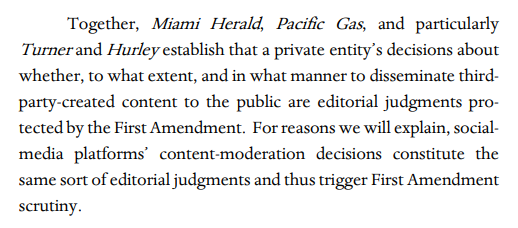
1/ The JCPA has changed since our letter, and since Cruz derailed it with a hostile amendment at markup. It *might* get marked up again this AM.
But issues with the bill persist, as we (along with @marklemley & @AnupamChander) wrote last night to explain: techfreedom.org/wp-content/upl…
But issues with the bill persist, as we (along with @marklemley & @AnupamChander) wrote last night to explain: techfreedom.org/wp-content/upl…
https://twitter.com/TechFreedom/status/1567887634592329729
2/ The first notable change to #JCPA actually happened the evening before the last markup. Recall that the bill allows publishers to join together to negotiate the terms and conditions by which platforms "access" their content. But "access" was originally left undefined.
3/ That was a problem, as it could have amounted to imposed must-carry obligations on platforms. But last week's manager's amendment inserted a definition of "access" -- "acquiring, crawling, or indexing content." 

4/ According to JCPA's supporters, this resolves content moderation concerns: because the obligation to pay is triggered at that early stage, what a platform does *after* that (in deciding whether/how to display content) is left untouched by JCPA.
But is that really so?
But is that really so?
5/ The definition of "retaliation" is still so broad that aggrieved parties can frame routine content moderation as retaliation in protracted, vexatious litigation. 

6/ But there's another problem: the definition of "access" may cut off *some* moderation-based abuse, but JCPA is still a "must pay" bill--and that payment obligation is triggered before a platform has any idea what the content it has "accessed" even IS! 

7/ When a platform "crawls," it's discovering the content that's out there by following links on websites. And...crawling...from one to another. It then has to analyze the content, index it -- copy over the data, organize it in a way that makes it useful, and rank it.
8/ But before crawling, the platform has no idea what it's actually going to find--or whether it's content they want to allow on their service. Crawling is *how* platforms figure that out. JCPA forces them to pay for the privilege of deciding that content violates their policies. 

9/ JCPA could also force platforms to pay for content uploaded directly to their services, without asking for it, wanting it, or displaying it.
Hypo: consider YouTube. Say I'm a DJP with a JCPA agreement. I upload some awful video that violates TOS and is auto-flagged/rejected.
Hypo: consider YouTube. Say I'm a DJP with a JCPA agreement. I upload some awful video that violates TOS and is auto-flagged/rejected.
10/ YouTube hasn't done anything to go out and get this material. I foisted it on their servers. Nevertheless, because I uploaded it, YouTube has "acquired" it and I can demand payment! 

11/ That makes no sense, and has nothing to do with concerns about platforms seeking out content and not compensating fairly for it.
At a *bare minimum*, "access" should not apply to any content uploaded/posted directly to a platform. That's an entirely different thing.
At a *bare minimum*, "access" should not apply to any content uploaded/posted directly to a platform. That's an entirely different thing.

12/ Even if the bill made sure platforms didn't have to pay for content they chose not to carry, what happens when a platform *does* carry the content, but decides not to monetize it under their monetization policies? Surely that's an area of moderation that JCPA could denigrate. 

13/ One possible (if imperfect) way to fix that could be an affirmative defense. If a platform shows it applied generally applicable moderation/monetization policies in good faith, based on content's objectionable nature, they cannot be forced to pay or be subject to liability. 

14/ These are not perfect solutions, and they only begin to address JCPA's *many* issues. This bill is still nowhere near ready to see action.
We'll find out if the amended language will be marked up in ~30 min. Until then, check out last night's letter: techfreedom.org/wp-content/upl…
We'll find out if the amended language will be marked up in ~30 min. Until then, check out last night's letter: techfreedom.org/wp-content/upl…
15/ Apparently committee members haven't reached any kind of deal, so the bill is being held over again.
Which is good because I was *just* thinking how much I miss & long for things like spending long hours and late nights on a big filing/trial prep only for it to settle day-of
Which is good because I was *just* thinking how much I miss & long for things like spending long hours and late nights on a big filing/trial prep only for it to settle day-of
• • •
Missing some Tweet in this thread? You can try to
force a refresh








